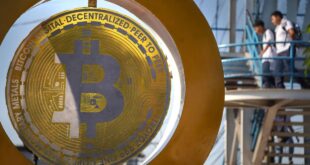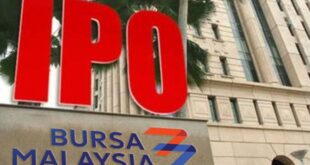TOKYO: Masayoshi Son’s once-exalted reputation as an investor is badly tarnished, but the irrepressible founder of Japan’s SoftBank is hoping that the mega- initial public offering (IPO) of Arm this week might bring back the good times.
The flamboyant farmer’s son who rose to become one of the world’s richest people is hoping that the United States listing of 10% of the chip designer will raise US$4.5bil to US$5.2bil.
That values the United Kingdom firm at up to US$52bil, a healthy gain on the US$32bil SoftBank spent in 2016 to take control of it.
However, the valuation of Arm, whose products are used in 99% of the world’s smartphones, is less than the US$60bil to US$70bil SoftBank was rumoured to be hoping for.
Such bullishness is typical for Son, 66, a man who when asked about going bald said: “My hair is not receding. I’m advancing.”
“The IPO looks likely to be a damp squib as all indications are that it has much lower exposure to artificial intelligence (AI) than what Son has been trumpeting – no surprise there”, Amir Anvarzadeh from Asymmetric Advisors said in a research note last week.
This is a reference to AI, a future growth area that excites investors but where Arm, which makes its money from smartphone microprocessors, is seen as less strong.
Son was born in Japan in 1957 to ethnic South Korean parents who scratched a living rearing chickens and pigs while battling discrimination.
“We collected leftover food from neighbours and fed it to cattle. It was slimy. We worked hard,” he said later. “And I’ve worked hard.”
He went to the United States aged 16 and while studying at Berkeley developed a translation machine that he sold for around US$1mil.
He founded investment group SoftBank in 1981 and made colossally successful early bets on Yahoo! and Chinese eCommerce giant Alibaba in the 1990s.
The former reportedly made him the world’s richest person for a few days and the latter, one of the biggest venture capital successes, made him seem like he had the Midas Touch.
On a high, Son launched in 2017 his tech-focused Vision Fund investment vehicle, securing billions in funding from others, including Saudi Arabia, won over by his investment magic.
At his eagerly awaited news conferences, he would show slides showing geese laying golden eggs and set out heady visions of an AI future.
But Yahoo! and Alibaba proved to be the exceptions, not the rule, and many other investments failed, some of them spectacularly.
This included office-sharing firm WeWork, ride-hailing business Uber and Oyo Rooms that cost Softbank painful amounts of cash.
“I won’t make any excuses. It was a very harsh lesson,” Son said after WeWork lost Softbank US$4.6bil in 2019.
In the past two years Softbank has reported losses of around US$20bil.
WeWork is only a going concern thanks to SoftBank’s repeated cash injections but last month the US firm warned it might not survive.
The Arm IPO, this year’s biggest flotation, is proving popular and is 10 times oversubscribed, prompting SoftBank to consider raising the price, according to reports.
Booking a gain from the Arm IPO “will help confirm he can deliver positive returns”, said David Gibson of MST Financial.
SoftBank’s remaining 90% in Arm could also be leveraged, like with Alibaba, to borrow money to invest in potential future golden eggs.
“Long term, I think Arm becomes a tool for financing investment into other unlisted tech companies,” said Gibson. — AFP
 BeritaKini.biz Berita Viral Terkini di Malaysia
BeritaKini.biz Berita Viral Terkini di Malaysia





